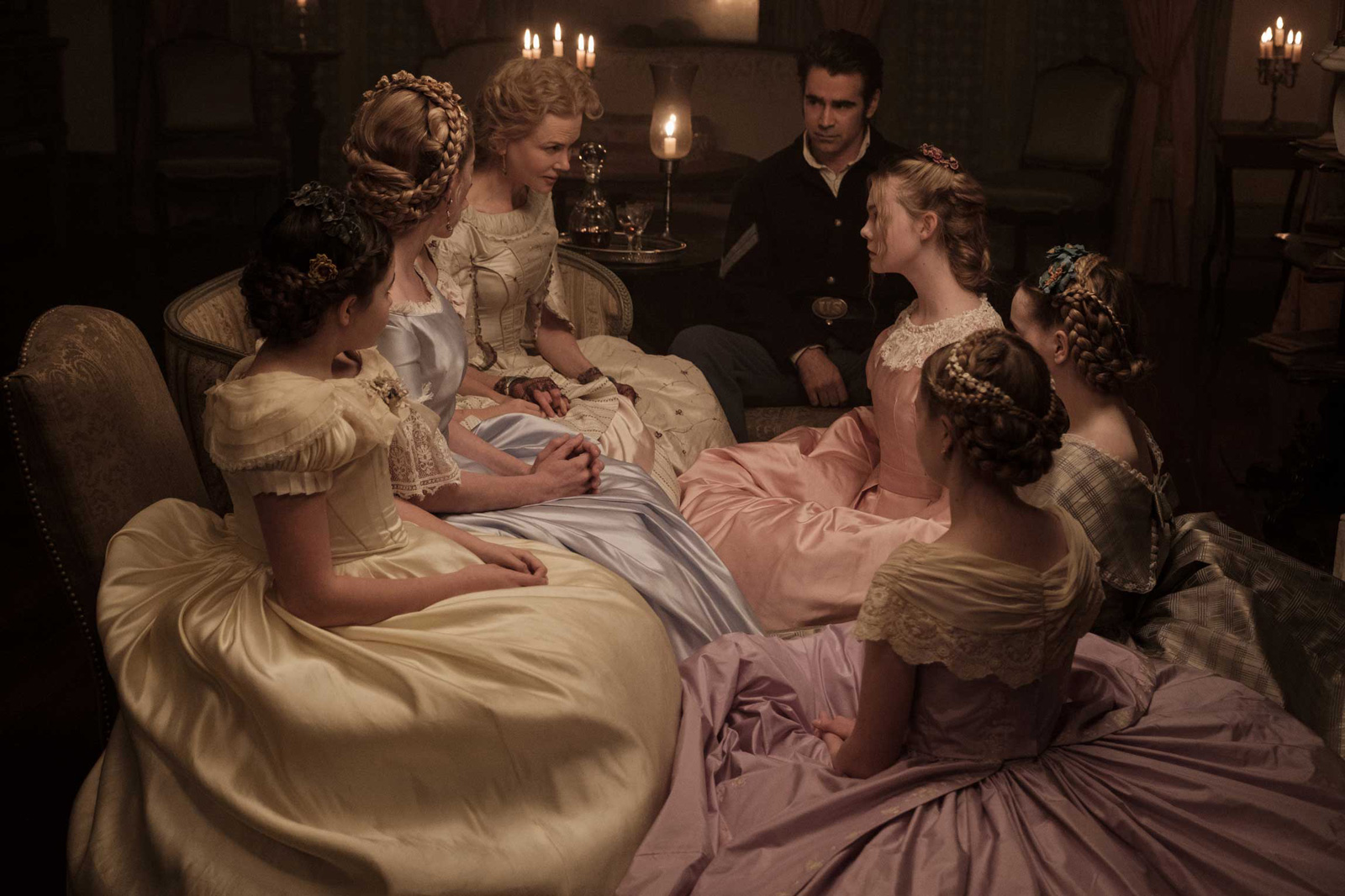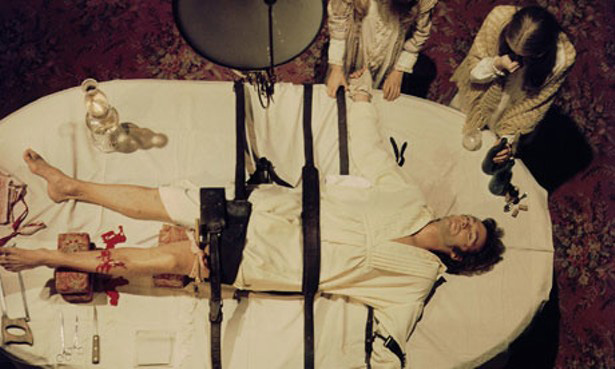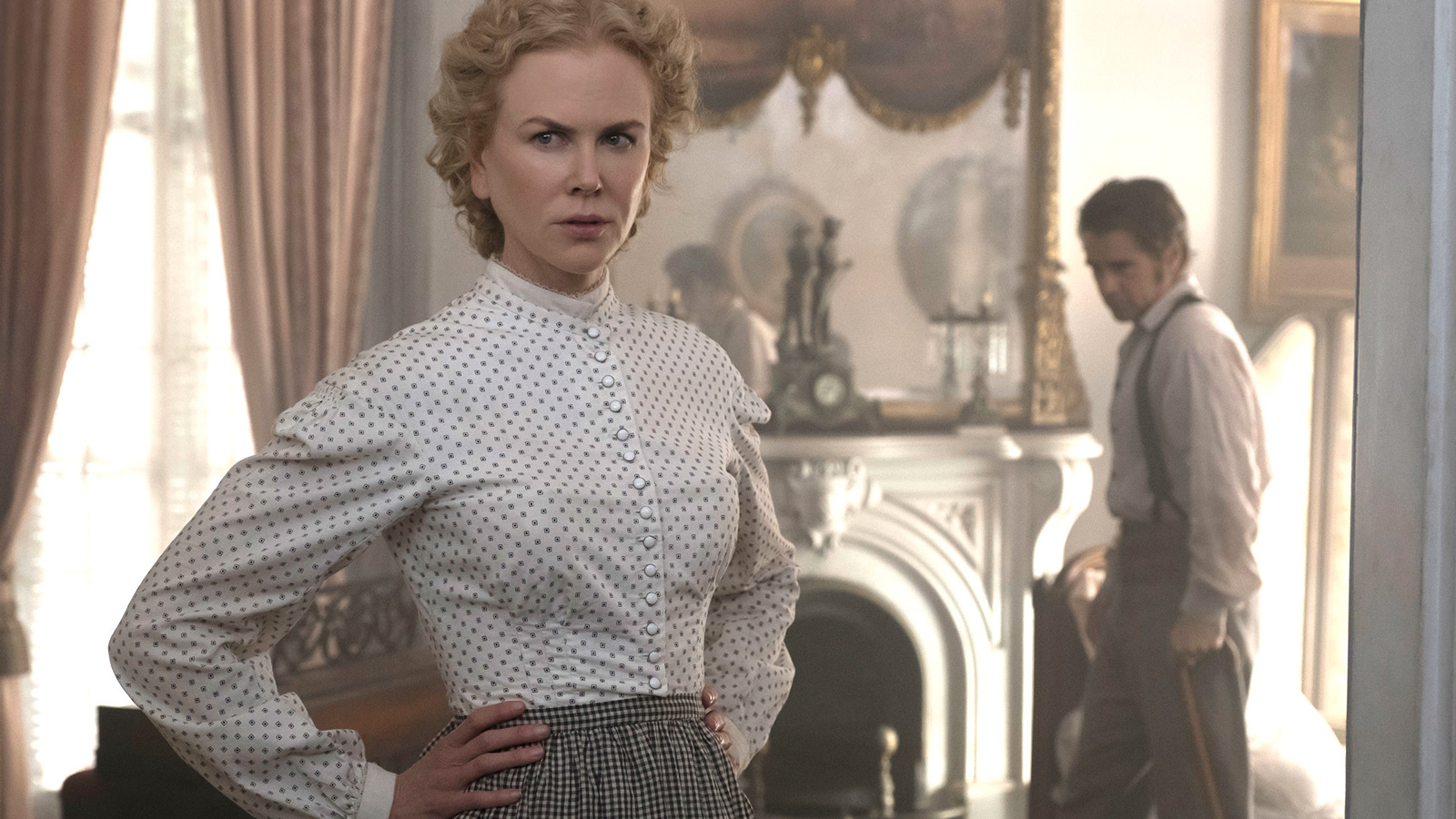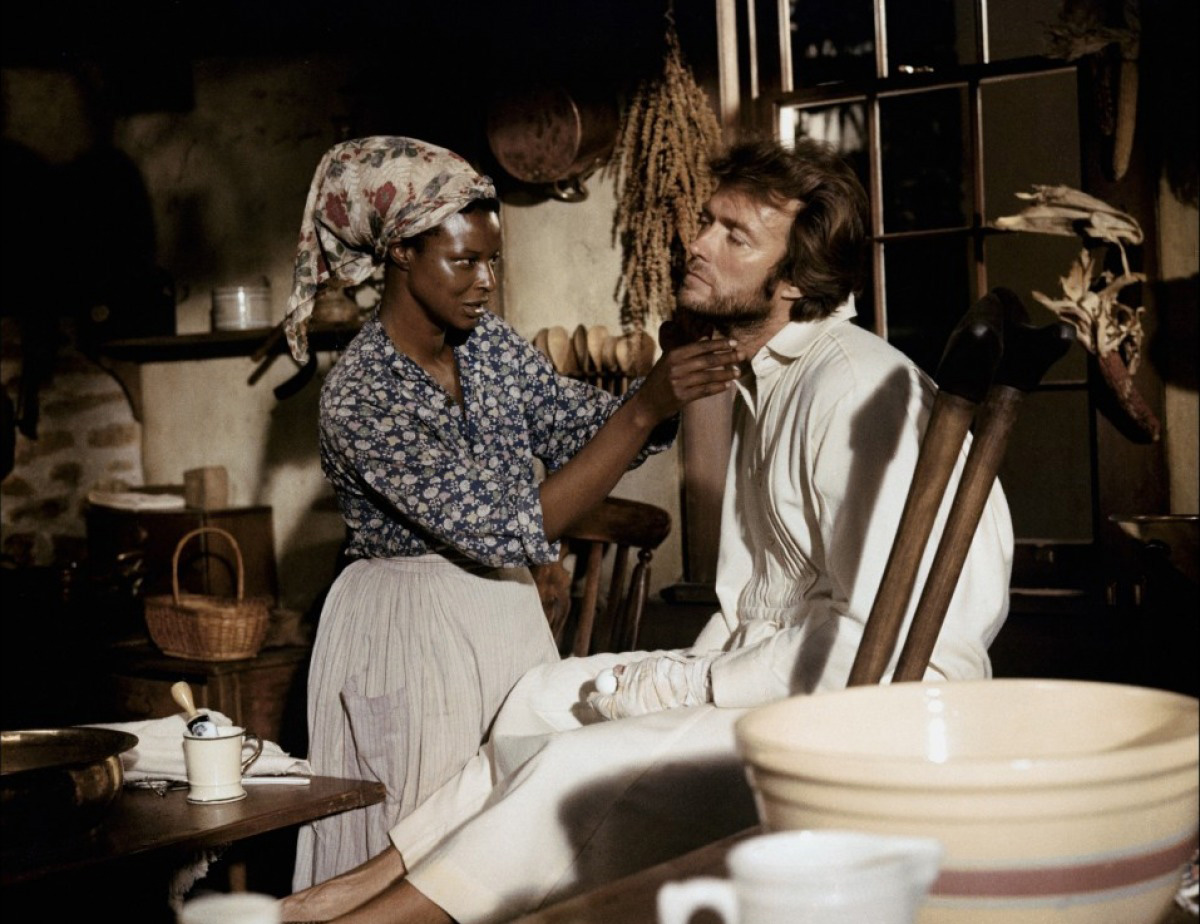Seen strictly on its own terms, Sofia Coppola’s remake of The Beguiled is an adept, mildly wicked, discreetly violent riff on the relations between men and women. Put next to the original, an overheated Clint Eastwood vehicle, directed by Don Siegel, it’s a good deal more.
Released in early 1971, the Siegel film was an arty detour into Tennessee Williams territory by the preeminent genre director of postwar Hollywood—maker of such unpretentious gems as Riot in Cell Block 11, Invasion of the Body Snatchers, Baby Face Nelson, The Lineup, and the 1964 version of The Killers. Siegel, who also directed Elvis Presley’s most credible performance in the western Flaming Star, made five movies with Eastwood. The Beguiled, based on a Civil War novel by Thomas P. Cullinan, was the third, and by far the most florid, installment of their flourishing relationship. (Siegel gave Eastwood the pet name “Clintus,” and his career role, as Dirty Harry, would come next.)
Three years into the Civil War, a twelve-year-old Southern girl discovers a badly wounded Union soldier, Corporal John McBurney (Eastwood), hiding in the woods and brings him back to her plantation-house school, the Martha Farnworth Seminary for Young Ladies. McBurney is nursed back to health in this completely female realm. Cullinan’s first-person novel assigns each chapter to a specific woman. Siegel’s film, which was reworked and revised by several writers, is more or less from McBurney’s perspective, unfolding in a hot-house atmosphere of universal man-hunger. Both the headmistress Miss Martha (Geraldine Page) and her sole teacher Miss Edwina (Elizabeth Hartman) develop feelings for the Yankee corporal, which he does his best to encourage; after he seduces a teenage student however, the older women turn on him, with grisly results.
The initial writer, Albert Maltz, a former Communist who had come off the blacklist with the previous year’s Siegel-Eastwood collaboration, Two Mules for Sister Sara, wanted a happy ending, as did the picture’s studio, Universal. However, Siegel and Eastwood held firm. A rooster with a coxcomb pompadour, McBurney may be the most charismatically unpleasant character Eastwood ever played—although it’s possible that he imagined himself something like the omnisexual redeemer of Pasolini’s Teorema, which opened in the US shortly before The Beguiled went into production.
Siegel, who seldom misses an opportunity to analogize McBurney’s mutilated body with Jesus Christ, called The Beguiled “the best film I have ever done, and possibly the best I will ever do.” Eastwood was more ambivalent, particularly after the movie flopped at the box office. He would say that McBurney would have been a better part for Dustin Hoffman or Al Pacino, actors who “play losers very well”—although he did temper his judgment once French critics hailed the movie as a masterpiece.
Masterpiece of misogyny might have been a better way to describe it. In his memoir, Siegel recalls telling the dubious Maltz, “pull off the mask of these innocent, virginal nymphs and you will reveal the dark, hidden secrets of wily manipulators.” (Maltz demurred on humanist grounds and was replaced.) There’s nothing subtle here. Siegel was hardly exaggerating when he described the movie’s subject as “the basic desire of women to castrate men.”
What then drew Sofia Coppola to this primal swamp? Beginning with her 1999 adaptation of The Virgin Suicides, her movies have been typically set in enclosed worlds and all have had young, female, usually privileged main characters. Her most consistent interest is fantasy play in a hermetic environment, whether the Tokyo hotel of Lost in Translation, the Chateau Marmont of Somewhere, or the court of Louis XVI in Marie Antoinette. Her most recent feature, The Bling Ring, the fact-based story of a teenage Beverly Hills gang devoted to looting the houses of the local rich and famous, is both a critique and celebration of this solipsism.
Coppola is, along with Kathryn Bigelow, Hollywood’s preeminent female director. But, unlike Bigelow, who is primarily an action director, Coppola’s sensibility is, to apply a term she used to describe her ambitious, candy-colored, pop-scored Marie Antoinette, unabashedly girly. The cursive font and pink lettering used in the ads and credits for her version of The Beguiled tells you as much. She is more provocatively feminine than overtly feminist—but all the more feminist for that.
Siegel’s Beguiled was an expression of male hysteria (anxiety is too mild a word to characterize its juicy claustrophobic tumult). Coppola’s version is a dark comedy of manners. Played by Colin Farrell, a far less imposing hunk than Eastwood, her Corporal McBurney isn’t so much fox in the henhouse as snake in the garden. Despite the war, the Seminary for Young Ladies is one step from Eden, a blessed state populated by corseted angels in long white muslin dresses.
Advertisement
More than one review has described Coppola’s Beguiled as a fairytale but, if so, it is closer to Angela Carter than Charles Perrault. Christian charity mixes with sexual curiosity. Coppola’s remake is more contemplative and psychologically complex than the original, as well as more suspenseful—particularly if you anticipate the corporal’s drastic fate. Predicated on the kindness of women, rather than their duplicity, this Beguiled evokes the soul singer Al Wilson’s 1968 recording “The Snake,” an Aesopian tale of a “tender woman” who misguidedly revives a vicious reptile only to be fatally bitten. (The song is deeply imbedded in our popular culture. Last year, candidate Trump several times recited its lyrics by way of warning against the danger of Syrian refugees.)
McBurney is a canny flatterer and the women bloom in the light of his attention. In Siegel’s movie they are vivid types; in Coppola’s they are humanized. The original Miss Martha (played by an actress closely associated with two Williams plays, Summer and Smoke and Sweet Bird of Youth), was a creature of flaming denial with a history of incest and a fervid erotic imagination. In Coppola’s version, the head mistress, embodied by steely, self-contained Nicole Kidman, has no such dark past or kinky yearnings, although she is delicately fascinated by McBurney’s body when she gives him a sponge bath.
Coppola’s women are also less overtly damaged. The tremulous Elizabeth Hartman, an actress who radiated fragility (and in fact committed suicide at age forty-three), is replaced as Miss Edwina by sturdy Kirsten Dunst; the smitten student, Elle Fanning, is more naïve than Jo Ann Harris’s pert hussy (reportedly Eastwood’s lover during the shoot). McBurney is humanized as well. Eastwood’s corporal claimed unconvincingly to be a Quaker; Farrell’s is a hapless Irish immigrant who admits to having taken $300 to replace a draftee.
Still, Coppola’s tendency to airbrush history, already pronounced in Marie Antoinette, is amply evident. While sticking closely to the trajectory of Siegel’s film, she eliminates a number of details. Save for the corporal, the war is present only as distant smoke and thunder. Siegel’s film began with a brutal mock-Mathew Brady battlefield montage; Coppola’s opens in a bucolic landscape with shafts of sunlight piercing the Spanish moss.
The crucial alteration, much remarked upon in the film’s more knowledgeable reviews, is the omission of the school’s enslaved housekeeper, Hallie. In Siegel’s version, it is she who gives the corporal his sponge bath and who is the first woman he propositions, hissing, “You and I ought to be friends. We’re both prisoners here.” The line leaves her singularly unimpressed.
As played by Mae Mercer, Hallie is less a product of the 1860s than the 1960s. (Having spent much of that decade as a blues singer in a Paris club owned by Olympia Press founder Maurice Girodias, Mercer followed The Beguiled by producing a documentary on Angela Davis.) Hallie is formidable. When the corporal compliments her physical charms she suggests that were he to make love to her, he’d be raping a corpse. The film’s other women pale by comparison.
More than a gesture to Eastwood’s African-American fan base, Hallie’s militancy is appropriate to a film that appeared at the dawn of the Blaxploitation era, opening when Melvin van Peebles’s Sweet Sweetback’s Baadasssss Song was the nation’s number-one box office attraction. She cannot be accommodated in Coppola’s world. Her absence effectively frees the seminary and its women from the burden of the South’s essential sin, and serves as a reminder that among Coppola’s distinctive traits is a blithe acceptance of privilege.
Paradoxically, it is precisely that entitlement that provides The Beguiled’s conviction. Coppola’s movies alternate between drop-dead hip and cluelessly clueless; The Bling Ring was underrated largely because audiences mistook the filmmaker’s deadpan satire of banality, shallowness, and lack of affect for her actual shallowness. The Beguiled is dependent on Coppola’s ability to invest Nicole Kidman with the authority to dispatch a faux Clint Eastwood. Miss Martha’s imperious “Edwina, bring me the anatomy book,” delivered while wearing a blood-spattered frock, is a laugh line with an edge. In the end, Coppola’s ladies pack off their unwelcome guest with the same brisk efficiency with which Coppola cleans up Don Siegel’s manly mess.
Advertisement
Sofia Coppola’s The Beguiled is now in theaters.





